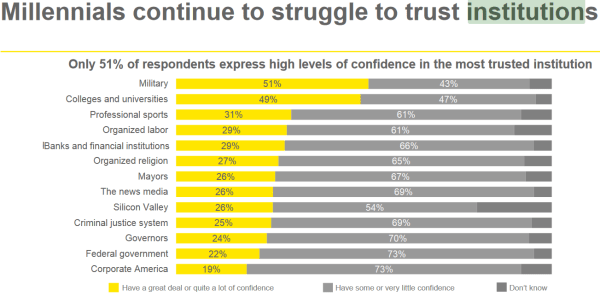Millennials are having children and buying homes later in life than past generations, according to a study commissioned by accounting firm EY.
The generation born after 1995 feels more secure economically than they did two years ago, but they aren’t convinced the stability will last. Millennials also face record levels of student debt.
Family
- 40 percent of millennial women are mothers. When Generation X women were the same age, 57 percent already had children.
- 40 percent of millennials own their own homes, compared with 26 percent in 2016. However, 45 percent of Gen Xers and Baby Boomers were homeowners when they were the same age.
Finances
- 80 percent of millennials say that student debt has forced them to delay home ownership.
- 59 percent worry about paying back their student loans.
- 35 percent claim to be making just enough money to cover their expenses
- 30 percent are not making enough to even keep up with expenses.
- 75 percent worry that Social Security will be unavailable when they are ready to retire, and 70 percent worry about not having enough money to live off of when they eventually retire.
- Only 6 percent feel they are making a lot more than required to cover basic needs. For millennial women, the figure is only 3 percent.
- 63 percent would have difficulty covering an unexpected $500 expense.
- 44 percent would dedicate $5,000 in lottery winnings to paying off bills and loans, signaling a struggle to launch, save and invest.
- 25 percent of 18-21 year olds feel they pay too much in taxes, rising to 39 percent by ages 30-34.
- 30 percent of those making less than $20,000 a year felt they paid too much in taxes, rising to 37 percent of those who made more than $100,000 a year.
- 71 percent of millennials worry about America’s debt and deficit levels.
- Only 36 percent of white men and 27 percent of white women believe they’ll be better off than their parents.
- A majority of hispanic men (52 percent) and black women (54 percent) believe their standard of living will surpass that of their parents.
Career
- 86 percent of millennials believe working hard is extremely or very important to getting ahead in life.
- Nearly 40 percent believe that staying with one company is the best way to advance their career.
- 72 percent believe that startups and entrepreneurship are essential for new innovation and jobs in our economy.
- 59 percent believe that the government makes it difficult for people to succeed in starting their own businesses.
- 38 percent say they do not have the financial means to start their own business — though they would like to — and 16 percent are afraid that their business would not succeed.
- 58 percent have considered starting their own business.
- 58 percent believe their generation is more entrepreneurial than other generations.
- Black women are the only millennial demographic in which a plurality (39 percent) believe that starting their own business is best way to get ahead.
- 71 percent of black women have considered starting their own business, making them the most entrepreneurially inclined of the millennial cohort. Their inclination to chart an independent path may stem from their lack of confidence in established institutions.
Social
- 77 percent of millennials report that they are proud to be American.
- But, only 30 percent report high levels of confidence in American institutions.
- Since 2016, trust in higher education, corporate America, Silicon Valley, organized labor and the criminal justice system has decreased, while trust in media, organized religion and local government has increased.
- 64 percent believe high-net-worth individuals and big corporations are not paying their fair share of taxes.
- 50 percent feel they are paying the right amount of taxes.
Research Now conducted a survey on behalf EY of 1,202 U.S. residents ages 20 to 36 nationwide. The researcher contacted 842 respondents online and 360 by cellphone. Survey participants were contacted between June 27 through July 13.

Source: EY

